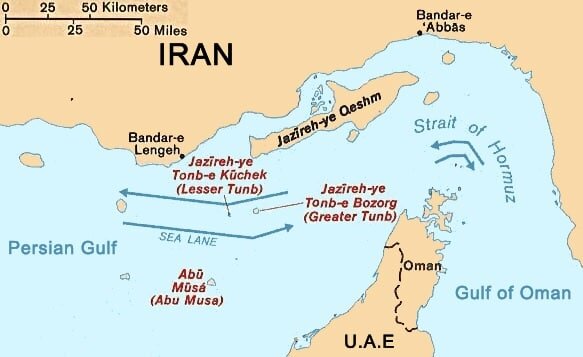The occupiers who played us off against each other

TEHRAN- “It is clear as daylight that Bahrain islands have been part of the ‘Great Government’ from the time of ancient kings until now and sheikhs and the people of Bahrain under the rule of the ‘Great Government’ are enjoying a prosperous life and busy with serving the ‘Great Government’.
We are not to blame for our misbehavior in the recent time, but it is the ‘Great Government’ that has neglected this territory . . . My brother Sheikh Ali Ibn Khalifeh, and I as well as the people of Bahrain are the subjects of the ‘Great Government’, and we are ready to serve and to show our loyalty to the ‘Great Government’. I have hoisted on my house the Great Government’s flag bearing the sign of sun and lion.”
What you read is part of a letter written by the sheikh of Bahrain to the King of Iran in April 1860. It all began when the British navy brought its fleet to the Persian Gulf. Britain had put pressure on the sheikhs of Bahrain to fly the British flag there. Bahrain sheikhs who had resisted at the beginning and insisted that Bahrain was part of the Iran soil finally acquiesced to hang out the flag after British navy destroyed their ships.
Britain also increased its pressure on the governments of Sharjah and Ras Al Khaimah to hoist their flags in Tunb and Abu-Moussa. The sheikhs in these areas also first considered these islands parts of the Iranian land and did not give in but they finally leaned toward British army and raised their flags on these islands.
The Qajar government began its diplomatic attempts to regain Iran’s right to rule over the triad islands as well as Bahrain and declared it illegal to hoist other flags in the Persian Gulf, Tunb and Bu-Moussa islands. Iran in its correspondences referred to the geographical map which had been drawn by Britain for the Iran government. In that map, the islands of Tunb and Abu-Moussa had been shown in Iranian color. These diplomatic attempts were not in vain and the British government on April 18, 1870 recognized Iran’s sovereignty over the triad islands and Bahrain, but wrote to Iran’s government that, due to Iran’s weak navy, the British government is responsible for the security of these islands and the Persian Gulf for the time being.
But Britain again provoked the sheikhs of Persian Gulf to hang out [their own] flags. Several decades later, Mohammad Mossadegh, the Iranian prime minister, explained in a speech: “Be aware why the English government wants the two mentioned islands to be parts of Sharjah and cut the Iranian government’s control over them. It is obvious and everybody knows what their goal is: it is easier to gain advantage from the sheikhs of Sharjah than from the civilized and constitutional government of Iran.”
Hundred years of political endeavors and negotiations between different Iranian and British governments finally resulted in the unjustly separation of Bahrain from Iran with the promise to ease the triad islands issue. A memorandum of understanding was singed, and Iran could regain the triad islands after many years.
Britain, however, following its long-held policy, did not bring the issue into end peacefully. In the agreement, the word used for Iran’s military presence in the triad island, was “occupation”, a term which later was open to dispute and a source that Iran has occupied these islands. Taking a quick look at the history, one understands easily that this is Britain who had occupied these islands.
A retrospective look at the history of these islands over the last 100 or 200 years shows that the northern and southern neighbors in the Persian Gulf have been living together peacefully for years without any problem until British occupiers reached there and changed it forever.
Leave a Comment